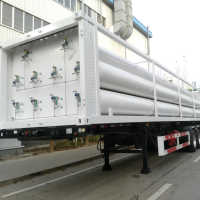The federal government has expressed its plan to have up to one million vehicles – mostly passenger and haulage vehicles that run on Nigerian roads to start using gas instead of petrol or diesel by the end of 2021, in its new push to enthrone gas as a preferred fuel for the domestic economy. To accomplish this, it explained that it is optimistic that the N250 billion financial facility recently earmarked by the Central Bank of Nigeria (CBN) to fund the Autogas programme amongst other gas initiatives in its National Gas Expansion Programme (NGEP) would help fast-track vehicle conversion and deployment of required infrastructure for the initiative.
Speaking on the progress of the plan, the Justice Derefaka who is the Technical Adviser (TA) on Gas Business and Policy Implementation to the Minister of State for Petroleum Resources, Mr. Timipre Sylva, said Nigeria’s switch to gas as a transport fuel has gained a steady momentum. Derefaka who doubles as the Program Manager (PM) in charge of the Autogas sub-committee in the NGEP, explained at a TEDx meeting that so far the government working with key stakeholders such as gas processing companies and transport unions, have identified 9,000 service stations across the country to co-locate Autogas dispensing facilities. Forty six of these, he noted are owned by the Nigerian National Petroleum Corporation (NNPC) and will host the dispensing facility by the fourth quarter of 2020.

Furthermore, Derefaka stated that about one thousand conversion kits for trucks and smaller vehicles would be deployed nationwide by third parties in the programme while 50 conversion centers are currently been upgraded for mass conversion and trainings.
According to him, there are also auto assemblers supported in the country to produce fit-for-purpose dual fuel vehicles, with over 30,000 vehicles already running on dual fuels in Nigeria.
While the government equally targets to create two million new jobs per annum from the programme, Derefaka explained that by the second quarter of 2021, 600 NNPC-leased and affiliate co-location stations would have been brought into the scheme.
By then, he said that, “about 1 million conversion kits for trucks and smaller vehicles will deployed, 1 million vehicles expected to run on Autogas.”
He stated that the government recognised that infrastructure deficit such as inadequate public recharging and re-fuelling locations, consumers’ lack of awareness of the benefits using gas as transport fuel as well as inadequate capacities for conversion and financing acquisition of conversion kits could derail the programme and as such continued to find solutions to them including the N250 billion CBN facility.
Speaking on the expected benefits of the switch, Derefaka noted that a price comparison analysis done by the NGEP put Autogas at N75 litre while petrol is at N161 per litre.
He also said that: “It allow drivers and fleet managers to reduce PMS use, minimise emissions, decrease of greenhouse gas (GHG) emissions. Better fuel price stability and reduced fuel costs in the long run, displace gasoline and diesel use, which reduces reliance on PMS.”
“Shifting from PMS to Autogas gas provides increased flexibility for an oil-dependent transportation system. [It is] highly economical to run. Saves running cost by up to 40-50 per cent than that of petrol.
“The total cost of the conversion can be recovered easily from the savings accrued by use of Autogas in lieu of petrol. There is no spilling when filling the tank and no possibility of theft or pilfering. Complete adulteration free fuel as compared to petrol or diesel. Reduce dependence on foreign exports and create a more stable energy market less susceptible to supply price volatility,” he stated while noting that the scheme will be self-financing.
Source: This Day News October 13th 2020
